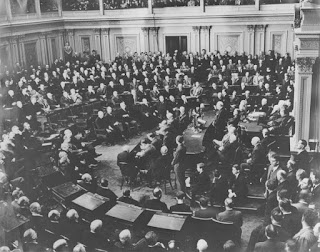80 years ago yesterday, on December 26, 1941, British Prime Minister Winston Churchill addressed the U.S. Congress in the Senate Chamber. It was less than three weeks after Pearl Harbor and the belated American entry into the Second World War. Churchill was the first of several allied leaders to address Congress during the war (among them, King George II of Greece on June 15, 1942, and Queen Wilhelmina of the Netherlands on August 6, 1942).
Once the U.S. had joined the war, Churchill was eager for another face-to-face with his new ally, who he understood would be Britain's (and civilization's) savior. He arrived in Washington on December 22. Famously, First Lady Eleanor Roosevelt recalled being told by the President “that we would be having some guests visit us.” As she later wrote in The Atlantic: “He told me that I could not know who was coming, nor how many, but I must be prepared to have them stay over Christmas.” He also told her to "see to it that we had good champagne and brandy in the house and plenty of whiskey.” On December 23, Roosevelt and Churchill held their first join press conference of the war. On Christmas Eve, they participated in the traditional lighting of the National Christmas tree. On Christmas Day, they attended church together. After his December 26 address to the U.S. Congress, Churchill went on to Ottawa to address the Canadian Parliament on December 30.


No comments:
Post a Comment